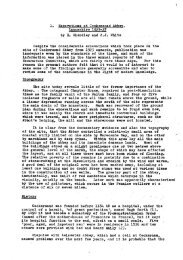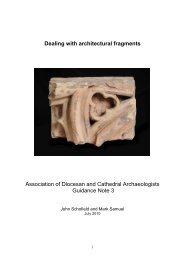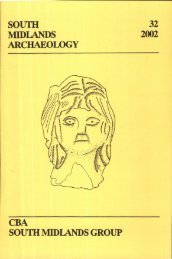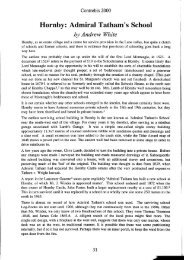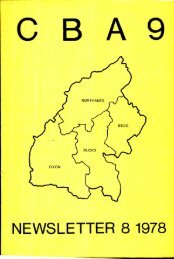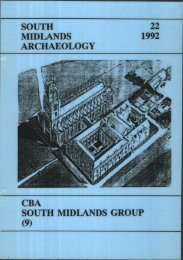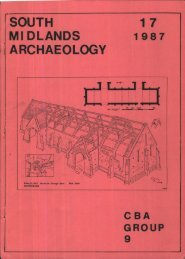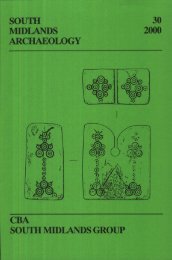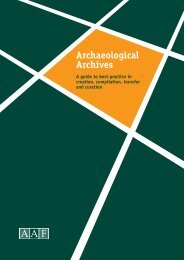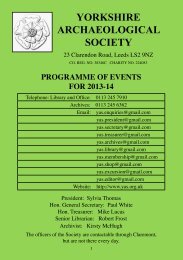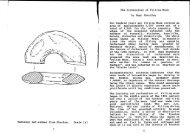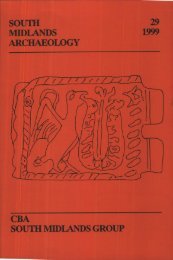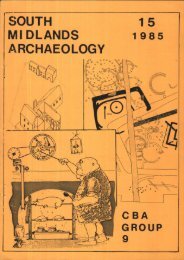Untitled - Council for British Archaeology
Untitled - Council for British Archaeology
Untitled - Council for British Archaeology
Create successful ePaper yourself
Turn your PDF publications into a flip-book with our unique Google optimized e-Paper software.
. The<br />
, BILL<br />
Editorial<br />
We make no excuse about returning to the<br />
theme of rescue archaeology. Rescue has<br />
been the dominant archaeological problem since<br />
'1970 and is likely to remain so*throughout therest<br />
of the decade.<br />
As predicted in earlier editorials there<br />
has been a'reactiOn against rescue archaeology<br />
in 1975: Surprisingly this reaction<br />
has comë, not from those who control the,<br />
purse-strings, but from within the archaeological<br />
'profession' itself. The eneral"<br />
argument is that a great deal of money spent<br />
on rescue work over the past few years has<br />
been wasted and that we should return to research<br />
based investigation.<br />
While there is little'doilbt.that muCh is<br />
still wrong with the orumization and implementation.<br />
of rescue archaeolog, this'arguMent<br />
ignores much of what has haOliened- in recent<br />
years. In many of our ancient urban centres<br />
we have organizations to deal with re'clevelopment<br />
threats. lu most counties too we have<br />
an archaeological presence capable of making<br />
some sort of response to threatened archaeological<br />
deposits. In many counti'es archaeological<br />
coniiderations are now firmly embodied<br />
in planning procedure. We are,tiow in the.'<br />
process of designing local, regional and<br />
national policies <strong>for</strong> rescue. There axe<br />
hopes <strong>for</strong> substantial improvements too in the<br />
areas of publication, conservation, data<br />
storage, retrieval and training. In short<br />
there have been a number of substantial<br />
achievementi on the organizational side.<br />
The essence of the research argument is<br />
that there are a number of 'good' sites and<br />
that we should concentrate our resources upon<br />
these to obtain the 'best' results. We now<br />
know that there are very many more sites than<br />
we had previously anticipated. Our whole<br />
concept of the nature of ancient settlement<br />
and its distribution has been changed (or at<br />
leas* it should have been), there<strong>for</strong>e, until<br />
we are in a better position to judge the<br />
totality of our archaeological resource we are<br />
in no position to make a final, or even intermediate,<br />
derti'sion on what is best. To ignore<br />
the destruccion of the many small tural sites<br />
threatened by urban expansion, major road<br />
schemes, mineral extraction and so on, is to<br />
pre-judge the nature of the evidence and to<br />
insist upon making decisions based on com<strong>for</strong>table<br />
but totally misleading data.<br />
A second point which those in their ivory<br />
towers do not appear to appreciate is that<br />
archaeology is now in many areas a public service.<br />
Many rescue based organizations are<br />
per<strong>for</strong>ming a pastoral role in recording local<br />
in<strong>for</strong>mation. To curtail this service would<br />
be to admit that archaeology in its widest<br />
sense had no, or little social relevance.<br />
It is difficult to know if those who are<br />
arguing <strong>for</strong> a return to the 'good old days'<br />
are serious or simply acting as devil's advocate<br />
in order to promote sensible research<br />
orientated rescue archaeology. If it is the<br />
latter they have our sympathy, if not, they<br />
should consider the damage they may ultimately<br />
inflict upon the whole of <strong>British</strong> archaeology<br />
by parading their antiquarian ideas.<br />
It is astonishing that in some quarters<br />
archaeology is still largely equated with excavation,<br />
and that often of a particular<br />
period site. Certainly the material presented<br />
in this Newsletter shows a proper emphasis<br />
on survey, with a concern <strong>for</strong> above ground<br />
evidence and the continuous occupation of<br />
sites, which one hopes is gaining general acceptance.<br />
It is an omission not noted in the<br />
review on Archaeological Publications (p. 3) -<br />
that the preoccupation a-ere is almost entirely<br />
with the results of excavation. As said last<br />
year, the new and wider view presents difficulties<br />
of arrangement <strong>for</strong> editors, but we<br />
trust that these have been met. This year<br />
the Bradwell Abbey Field Centre (Milton<br />
Keynes) reports are grouped together, as again<br />
are those from the Ox<strong>for</strong>d Unit, to facilitate<br />
separate distribution as offprints.<br />
Finally, once again we appeal <strong>for</strong> news from<br />
more societies and institutions and <strong>for</strong> contributions<br />
earlier. The deadlinc <strong>for</strong> Newsletter<br />
No. 7 is, hopefully, 30 November 1976.<br />
TREVOR. ROWLEY<br />
FOWLER .<br />
CBA and CBA9 - W.J. Fowler, Hon. Sec. CBA9<br />
wide range of CBA activities during the<br />
past year is fully set out 'in "<strong>Archaeology</strong>-in<br />
Britain 1974-5" (CBA 50p. post free), bût,<br />
like every organization these days, the CBA<br />
now fac:is financial difficulties. One of the<br />
most promising proposals is to establish an



